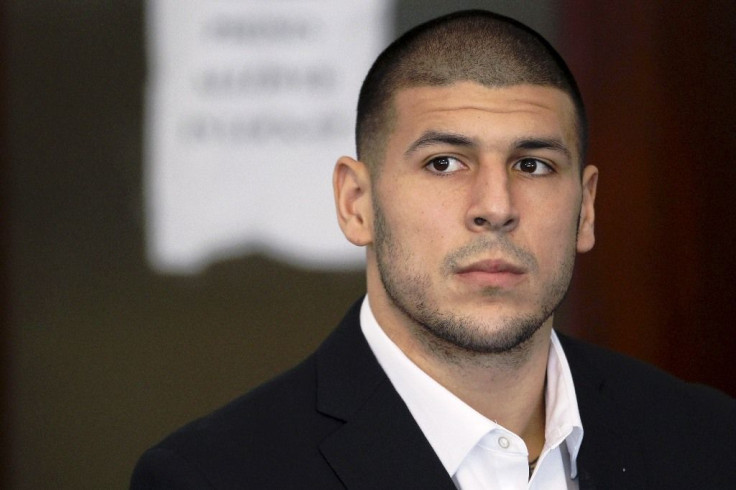Aaron Hernandez’s Murder Conviction Dismissal Could Get Millions For His Estate, Report Says

Prosecutors in Massachusetts argued Monday against the dismissal of former NFL-player Aaron Hernandez’s 2015 murder conviction saying it would reward his "conscious, deliberate and voluntary" act of committing suicide. If the murder conviction is vacated, Hernandez's estate — which is currently reported to be worth nothing — could likely get millions, USA Today Sports said.
Hernandez, 27, was serving life imprisonment without parole for the 2013 murder of semi-professional football player Odin Lloyd. On April 19, he was found hanging from his prison cell window at the Souza-Baranowski Correctional Center in Shirley, Massachusetts.
Following his suicide, Hernandez’s lawyers sought to vacate his murder conviction under a Massachusetts law, which allows a conviction to be voided if the defendant dies prior to filing an appeal.
However, Bristol County District Attorney Thomas Quinn III argued, in a court filing Monday, that a defendant's death before an appeal does not necessarily need abatement, "at least where, as here, a defendant's death is a result of his own conscious, deliberate and voluntary act."
"In this circumstance a balance must be struck between the policy interests advanced by abatement, the effect of the defendant's actions in frustrating the interests of justice and the interests in maintaining the validity of the conviction," Quinn wrote in the filing, according to the Associated Press.
The prosecutors said that annulling the conviction would also ignore the "negligible probability of success" of Hernandez's appeal and that the legal principle of abatement does not have solid or historical public policy basis. Moreover, prosecutors argued that the dismissal of the conviction would be disrespectful to the victim's family, and would work against the civil suits pending against Hernandez.
However, Massachusetts School of Law Dean and President Michael Coyne told USA Today Sports it was unlikely that Hernandez’s murder conviction would not be vacated.
"The law is quite clear," Coyne said told the daily. "A person who doesn't have the opportunity to defend his or her appeal means there's been been no court review (of the conviction). The district attorney should be looking at the legislature, not the trial court."
As an investigation continued into Hernandez’s death, his fiancée Shayanna Jenkins and his lawyer filed an affidavit in probate court saying the deceased football star’s estate is worth “$0.00” with “no monies available and no identifiable personal assets.”
The New England Patriots — the team that Hernandez played for — did not pay him the remaining $6 million in guaranteed money under his contract, including the remaining balance of $3 million of his signing bonus, USA Today Sports reported. According to Coyne, vacating of the murder conviction would also fetch the deceased’s estate millions of dollars.
"If the conviction is overturned, the estate's attorneys could argue that he didn't violate the terms of the contract," Coyne told the newspaper. "That would be a strong argument since there would be no record that he [was] convicted of a felony. It would give the estate a chance to claim that he would be due all the money guaranteed under his contract."
© Copyright IBTimes 2025. All rights reserved.






















